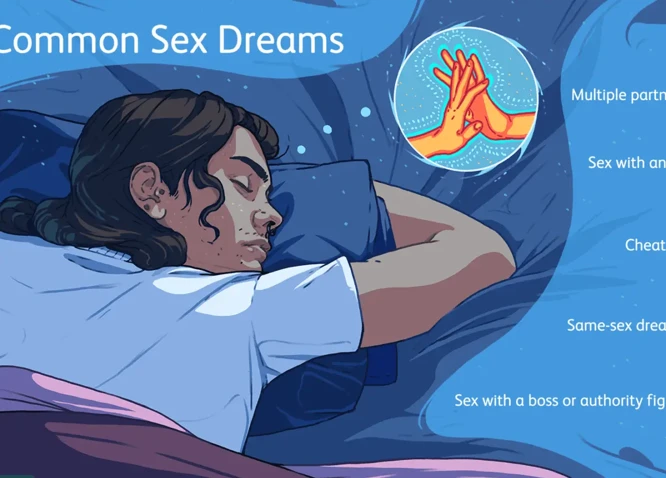Dreams are mysterious and often perplexing experiences that can offer valuable insights into our subconscious minds. One particularly intriguing aspect of dream symbolism is the meaning behind rejecting sex in a dream. Unlocking the deeper significance of this symbolic act can provide valuable insights into our fears, desires, and emotions. In this article, we will delve into the symbolism of dreams, explore the possible meanings of rejecting sex in dreams, and provide tips for interpreting common scenarios. By understanding the hidden messages in our dreams, we can gain a greater understanding of ourselves and our emotional lives. So, let’s embark on this journey of self-discovery and explore the fascinating world of dream interpretation.
Contents
- The Symbolism of Dreams
- The Meaning of Rejecting Sex in Dreams
- Interpreting Common Scenarios
- Tips for Exploring and Understanding Your Dreams
- Conclusion
-
Frequently Asked Questions
- 1. Why do we dream?
- 2. Can dreams predict the future?
- 3. Why do we have recurring dreams?
- 4. Are nightmares a sign of something wrong?
- 5. Can we control our dreams?
- 6. What is the significance of recurring symbols in dreams?
- 7. Why do dreams sometimes feel so real?
- 8. Can dreams help with problem-solving?
- 9. Do all dreams have meaning?
- 10. How can I improve dream recall?
- References
The Symbolism of Dreams
Dreams have long been regarded as a window into the subconscious mind, offering a unique glimpse into our inner thoughts, feelings, and desires. They are a rich tapestry of symbols and imagery, each holding its own significance and meaning. In the realm of dream interpretation, symbols serve as powerful tools for unlocking the hidden messages within our dreams. From flying to falling, encounters with animals to objects, every element in a dream carries symbolic weight. By analyzing these symbols, we can gain insights into our unconscious thoughts and emotions, ultimately leading to a deeper understanding of ourselves.1
1. Dreams as a Reflection of the Subconscious Mind
Dreams serve as a mirror of our subconscious mind, reflecting our deepest thoughts, desires, fears, and unresolved emotions. They provide a safe space for our unconscious to express itself freely, often presenting symbolic representations of our inner conflicts and desires. The symbolism in dreams is unique to each individual, as it is influenced by personal experiences, memories, and beliefs. By analyzing the content and symbolism of our dreams, we can uncover hidden truths about ourselves and gain insights into our emotional well-being. It is through this exploration of our dreams that we can begin to unravel the mysteries of our subconscious and understand the deeper layers of our psyche.2
2. Sexuality as a Symbolic Element in Dreams
Sexuality is a powerful and complex aspect of human nature, and it often finds its way into our dreams as a symbolic element. In dreams, sexual encounters or themes may not always be literal representations of desire or physical intimacy, but rather symbolize deeper psychological or emotional states. Sexuality in dreams can represent a variety of themes, such as the search for connection, the need for intimacy, or even the exploration of personal power dynamics. It is important to approach the interpretation of sexual symbolism in dreams with sensitivity and an understanding that these symbols can vary greatly depending on the individual’s personal experiences and beliefs. By recognizing the symbolic nature of sexuality in dreams, we can gain valuable insights into our subconscious desires and emotions.2
The Meaning of Rejecting Sex in Dreams
The act of rejecting sex in a dream can hold deep significance and offer valuable insights into our subconscious thoughts and emotions. There are several possible interpretations for this symbolic act:
1. Fear of Intimacy and Vulnerability: Rejecting sex in a dream may indicate a fear of getting too close to someone or being emotionally vulnerable. It could reflect a reluctance to let others in or a fear of being hurt.
2. Rejection of Societal Expectations: In some cases, rejecting sex in a dream could signify a conscious or subconscious rebellion against societal expectations or norms surrounding sexuality. It could be a rejection of the pressure to engage in sexual activity.
3. Desire for Emotional Connection: The act of rejecting sex in a dream could also indicate a deeper desire for emotional connection and intimacy rather than purely physical pleasure. It may suggest a yearning for a deeper emotional bond with a partner.
4. Repressed Feelings or Trauma: The rejection of sex in a dream could be a manifestation of repressed feelings or past traumas. It may be a symbol of unresolved emotional issues that need to be addressed and healed.
5. Fear of Commitment or Loss of Freedom: Sometimes, rejecting sex in a dream may reflect a fear of commitment or a fear of losing personal freedom. It could signify a reluctance to enter into a serious relationship or the fear of losing independence.
6. Symbolism of Specific Actions or People in the Dream: It is important to consider the specific actions or individuals involved in the dream. The context and details of the dream can provide further insights into the meaning behind rejecting sex in that particular scenario.
Understanding the meaning behind rejecting sex in a dream requires careful reflection and analysis of personal emotions, experiences, and circumstances. It is also important to remember that dream symbolism can vary greatly from person to person, so individual interpretation is key.
1. Fear of Intimacy and Vulnerability
Fear of intimacy and vulnerability is a common theme when it comes to rejecting sex in dreams. This could indicate a subconscious fear of getting too close to someone emotionally or a fear of being hurt in a relationship. It may stem from past experiences of betrayal or heartbreak, leading to a reluctance to open up and be vulnerable. This dream symbol could serve as a reminder to explore these fears and work on building trust and emotional connections in waking life. Understanding and addressing these fears can lead to a healthier approach to intimacy and relationships.2
2. Rejection of Societal Expectations
In the realm of dreams, the act of rejecting sex can also be seen as a rebellion against societal expectations. Society often places a strong emphasis on sexual activity and intimate relationships as milestones of adulthood and fulfillment. However, some individuals may find themselves questioning or rejecting these norms in their dreams. This rejection can stem from a desire to challenge societal pressures, to assert independence, or to explore alternative forms of connection and fulfillment. By rejecting sex in a dream, individuals may be finding their own unique path and asserting their autonomy in the face of societal expectations 2.
3. Desire for Emotional Connection
In dreams where the act of rejecting sex occurs, it can often be a reflection of a deep desire for emotional connection. This rejection may symbolize a longing for intimacy and closeness rather than a rejection of sexual desire itself. It could suggest that the dreamer is seeking a deeper connection with others on an emotional level, desiring a sense of vulnerability and emotional intimacy that goes beyond physical interactions. It could be an indication that the dreamer is craving a deeper emotional bond in their waking life, such as a desire for more meaningful relationships or a longing for a romantic partner who can provide emotional support and understanding. Exploring the underlying emotions and desires behind rejecting sex in dreams can assist in understanding one’s yearning for emotional connection and help guide personal growth and relationship fulfillment.1
4. Repressed Feelings or Trauma
Rejection of sex in dreams can also be linked to repressed feelings or trauma. Sometimes, past experiences or emotions that have been buried deep in the subconscious can resurface in the form of dreams. These dreams act as a way for the mind to process and release the repressed feelings or traumatic events. It is important to recognize that these dreams do not necessarily imply a literal rejection of sex, but rather symbolize a need for healing and resolution. By acknowledging and addressing these repressed emotions, individuals can begin the journey towards emotional healing and personal growth.2
5. Fear of Commitment or Loss of Freedom
Fear of commitment or loss of freedom is another possible interpretation when someone rejects sex in a dream. This fear may stem from a person’s reluctance to fully invest in a romantic relationship or the fear of losing their independence and personal space. It could be indicative of a subconscious desire to maintain personal freedom and avoid getting tied down in a committed relationship. This fear may be rooted in past experiences or societal pressures to conform to traditional relationship norms. It’s important to explore the underlying emotions and experiences surrounding this fear in order to gain a deeper understanding of its significance in the dream.3
6. Symbolism of Specific Actions or People in the Dream
When analyzing dreams, it is important to pay attention to the specific actions or people that appear within the dream. Each action and person can carry significant symbolism that may shed light on the meaning behind rejecting sex in the dream. For example, refusing a sexual advance from a stranger may indicate a desire to protect oneself from potential harm or unknown aspects of one’s own psyche. On the other hand, saying no to a partner or spouse in a dream could suggest a need for independence or a desire to assert boundaries within a relationship. Understanding the context and symbolism of these actions and people in the dream can provide deeper insights into the rejection of sex and its underlying meanings.2
Interpreting Common Scenarios
Interpreting common scenarios of rejecting sex in dreams can provide further insights into the underlying meanings. One such scenario is refusing a sexual advance from a stranger. This may signify a fear of vulnerability or a need to establish boundaries. Another scenario involves saying no to a partner or spouse, which could indicate dissatisfaction or a desire for emotional connection. Lastly, rejecting an ex-lover in a dream may stem from unresolved feelings or a need to move on. By analyzing these scenarios within the context of the dreamer’s emotions and experiences, a clearer understanding of the dream’s significance can be achieved.2
1. Refusing a Sexual Advance from a Stranger
Refusing a sexual advance from a stranger in a dream can carry various meanings and interpretations. It may signify a sense of caution and self-preservation, highlighting a need to protect one’s boundaries and personal space. This dream scenario could also reflect a fear of intimacy or vulnerability, as the stranger represents someone unfamiliar and unknown. Additionally, it might suggest a desire to maintain independence and autonomy, resisting outside influences or pressures. Exploring the emotions and context surrounding this dream scenario can provide valuable insights into one’s personal fears, desires, and beliefs about intimate relationships.3
2. Saying No to a Partner or Spouse
Saying no to a partner or spouse in a dream can reveal underlying concerns or issues within the relationship. It may reflect a desire for more autonomy or a need to assert boundaries. It could also signify unresolved conflicts or feelings of dissatisfaction. This dream scenario may prompt self-reflection and open up opportunities for communication and addressing any relationship issues that may exist. It’s important to approach these dreams with an open mind and a willingness to explore the emotions and dynamics at play within the relationship. By doing so, it becomes possible to foster a deeper understanding and strengthen the bond with a partner or spouse.2
3. Rejecting an Ex-Lover in a Dream
Rejecting an ex-lover in a dream can be a complex symbol that represents unresolved emotions or a desire to move on from a past relationship. It may signify a need to assert independence and break free from the emotional ties that still linger from the past. The dreamer may be rejecting the notions of revisiting or reliving a failed relationship, and instead, embracing the present and future possibilities. It is important to explore the emotional context of the dream and consider any unresolved feelings towards the ex-lover. By addressing these emotions and seeking closure, the dreamer can begin the healing process and open themselves up to new experiences and relationships.1
Tips for Exploring and Understanding Your Dreams
Exploring and understanding our dreams can be a captivating and enlightening endeavor. To get started, keeping a dream journal is key. By recording your dreams immediately upon waking, you can capture the details and emotions that may fade with time. This journal will serve as a valuable resource for identifying recurring symbols and themes in your dreams. Additionally, exploring the emotional context of your dreams can provide further insight. Pay attention to the feelings evoked during the dream and reflect on how they may relate to your waking life experiences. Finally, if you find that your dreams are deeply impactful or causing distress, seeking professional help from a therapist or dream analyst can offer guidance and support in unraveling the meaning behind your dreams.2
1. Keeping a Dream Journal
Keeping a dream journal is an essential tool for exploring and understanding the symbolism of your dreams. By recording your dreams as soon as you wake up, you capture the details and emotions that may fade over time. This can help you identify patterns, recurring themes, and symbols that appear in your dreams. Additionally, having a record of your dreams allows you to revisit them later and reflect on any changes or insights that may have occurred. Whether you prefer a traditional pen-and-paper journal or a digital format, the act of consistently documenting your dreams can enhance your ability to interpret their deeper meanings.2
2. Exploring the Emotional Context
Exploring the emotional context of dreams is a crucial aspect of understanding their meaning. Emotions play a significant role in our dream experiences, and analyzing them can provide valuable insights. Pay attention to the feelings you experienced during the dream – were you afraid, anxious, or relieved? Understanding the emotional landscape of your dream can help uncover the underlying messages and themes it holds. For example, feeling fearful during a dream of rejecting sex may indicate deeper anxieties about intimacy and vulnerability. By delving into the emotional context of your dreams, you can gain a deeper understanding of your subconscious thoughts and emotions.2
3. Seeking Professional Help if Needed
If you find yourself consistently struggling to understand the meaning of rejecting sex in your dreams and it is causing you distress or confusion, it may be beneficial to seek professional help. Consulting with a therapist or dream analyst who specializes in dream interpretation can provide you with valuable insights and guidance. They have the expertise to help you explore the deeper layers of your subconscious mind and unravel the hidden meanings behind your dreams. A trained professional can offer a fresh perspective, facilitate self-reflection, and assist in processing any emotions or unresolved issues that may be surfacing through your dreams.2 Remember, seeking professional help is a brave and proactive step towards better understanding yourself and improving your emotional well-being.
Conclusion
In conclusion, dreams serve as a fascinating portal into our subconscious minds, offering glimpses into our deepest fears, desires, and emotions. The act of rejecting sex in a dream holds various symbolic interpretations, ranging from fear of intimacy to a rejection of societal expectations. By exploring the specific scenarios and symbols within our dreams, we can gain a deeper understanding of ourselves and our emotional needs. Keeping a dream journal and seeking professional help if necessary can further enhance our understanding of our dreams and their significance in our lives. So, embrace the enigmatic world of dreams, and unlock the profound insights they hold.1
Frequently Asked Questions
1. Why do we dream?
Dreams are a natural and essential part of the sleep cycle. They are believed to serve various functions, including processing emotions, consolidating memories, and problem-solving.
2. Can dreams predict the future?
While some people believe that dreams can predict the future, there is no scientific evidence to support this claim. Dreams are mostly a reflection of thoughts, emotions, and experiences of the dreamer.
3. Why do we have recurring dreams?
Recurring dreams often indicate that there is an unresolved issue or emotional conflict in the dreamer’s life. They can serve as gentle reminders to address and resolve these underlying concerns.
4. Are nightmares a sign of something wrong?
Nightmares can be a manifestation of stress, anxiety, or trauma. They provide an opportunity for the subconscious mind to process and confront these negative emotions. Seeking support from a professional can be beneficial in managing recurring nightmares.
5. Can we control our dreams?
Lucid dreaming is a state in which the dreamer becomes aware that they are dreaming and can exert some control over the dream’s course. Lucid dreaming techniques can be learned and practiced to increase the likelihood of experiencing lucid dreams.
6. What is the significance of recurring symbols in dreams?
Recurring symbols in dreams often have personal meaning specific to the dreamer. Exploring the emotions and associations connected to these symbols can provide valuable insights into the dreamer’s subconscious mind.
7. Why do dreams sometimes feel so real?
During REM (rapid eye movement) sleep, the brain becomes highly active, while the muscles are temporarily immobilized. This state creates a vivid and immersive dream experience that can feel remarkably real.
8. Can dreams help with problem-solving?
Dreams can be a source of creative problem-solving as they provide the opportunity for the subconscious mind to form connections and explore different scenarios. It can be helpful to reflect on dreams to gain new perspectives on unresolved issues.
9. Do all dreams have meaning?
All dreams have some level of meaning, but not all dreams are equally significant. Some dreams may be simple reflections of daily experiences or random firing of neural connections, while others may hold deeper psychological or emotional insights.
10. How can I improve dream recall?
Keeping a dream journal by the bedside and recording dreams immediately upon waking can help improve dream recall. Creating a consistent sleep routine, prioritizing sleep, and reducing stress can also enhance dream recall and overall dream vividness.







